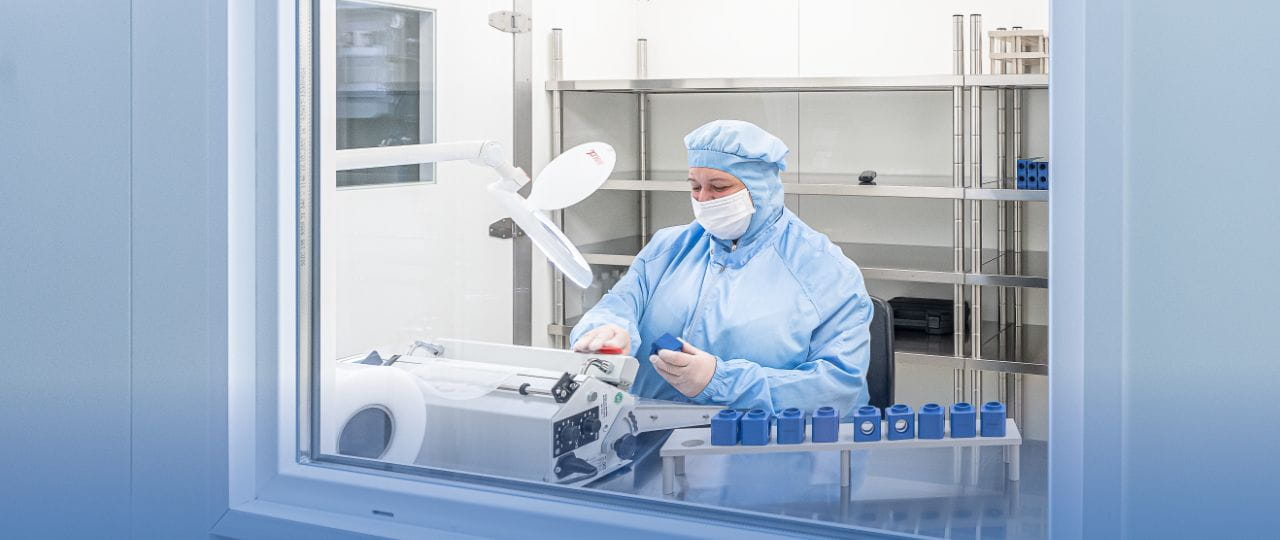



As a full-service provider of solutions for the pharmaceutical and biopharmaceutical industry, we focus on a fully integrated value chain. All process steps - from compound to finished component - can be covered under one roof. To meet the high demands of the industry, we produce suitable polymer compounds in-house, which are further processed into customised solutions using our broad portfolio of plastics processing technologies. With a wide range of further processing options, we produce ready-to-use components that are precisely tailored to our customers' requirements.
Thanks to its broadly based value chain, Ensinger offers optimum conditions for finished or semi-finished parts for the pharmaceutical and biopharmaceutical industries. Depending on the requirements profile, we offer high-precision machined parts, cost-efficient injection-molded parts in large volumes or customised tubes, rods and hoses. To minimise risk, plastics used in the biopharmaceutical and pharmaceutical industries must meet the detailed requirements of end users and system suppliers. Different applications place different demands on materials, such as sterilisability and autoclavability, chemical resistance or FDA compliance.
High-performance plastics are well suited for the pharmaceutical industry due to their durability, sterilisability and very good machinability towards demanding geometries and specifications while remaining highly cost-efficient. Plastic materials within the Ensinger MED- / MT-standard-portfolio are tested according to ISO 10993 pursuant to their intended use, preferably on the product. They fulfil the requirements specified in the respective test. However, the evaluation of biocompatibility can also be completely adapted to the customer's individual needs. Ensinger Medical Grade (MT) plastics are often a very good metal substitute. With our Ensinger Medical Grade (MT / MED) standard portfolio, we offer a wide variety of materials that are very well suited for the use in biopharmaceutical and pharmaceutical applications. Due to their light weight, high-performance plastics are often use to replace metal in these industries.
By offering solutions for high-performance plastics that meet the requirements of the pharmaceutical industry, experience has also been gained with respected suppliers at numerous levels of the industry's supply chain. Certain Ensinger products are also suitable in the single-use sector: together with our customers, significant advantages over typical stainless steel types have been demonstrated. For example, the single-use approach completely eliminates the need for cleaning and cleaning validation in the end application, as well as the risk of cross-contamination. This shortens downtimes and increases plant productivity. In addition, single-use systems in pharma and biopharma provide additional protection against hazardous substances for users and patients.
In the manufacture of our products no animal substances are used based on the recipe. However, plastic materials may contain secondary products or derivatives of animal origin. In most cases, these are fatty acids or fatty acid esters produced according to the specifications of guideline EMA/410/01 Rev. 3, section 6 or according to the specifications of the WHO Guidelines ( WHO Guidelines on Tissue Infectivity Distribution in Transmissible Spongiform Encephalopathies, 2006).
Usually our plastics comply with the requirements of these guidelines either because they do not contain substances of animal origin or because the manufacturing processes of the derived products are suitable to inactivate transmissible TSE/BSE agents.
USP Plastic Class VI is a standard for evaluating and testing the biocompatibility of plastics, which is defined in chapters <87> and <88> of the USP. There are six classes, of which USP Plastic Class VI has the highest requirements. Originally, the classification was intended for the testing of packaging for pharmaceutical products. The USP-NF ~ United States Pharmacopeia and National Formulary, is the official pharmacopeia of the United States of America. It is published by the United States Pharmacopeial Convention, the organisation that establishes standards in the United States regarding the identity, quality, purity, designation, packaging and storage of drugs. Currently, USP Plastic Class VI is often required for product-contacting materials and components used in the processing of pharmaceutical products.

Injection-molded and machined TECAPEEK MT black

made of TECAPEEK MT natural

made of TECAPEEK MT natural
